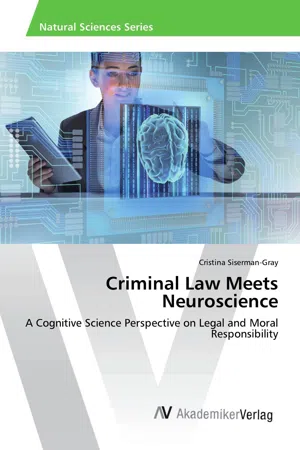
Criminal Law Meets Neuroscience
A Cognitive Science Perspective on Legal and Moral Responsibility
- 168 pages
- English
- PDF
- Available on iOS & Android
Criminal Law Meets Neuroscience
A Cognitive Science Perspective on Legal and Moral Responsibility
About this book
As cognitive science continues to develop and inform our understanding of the brain, the opportunities for using neuroscientific evidence in criminal proceedings have also increased. The study discusses in an interdisciplinary manner the impact of neuroscience on the debates related to the concept of free will. It also analyzes how methods and tools of neuroscience can help in assessing the moral and legal responsibility of an individual. The study focuses on two major issues, which are addressed at length from a legal, philosophical and scientific standpoint. First, it evaluates from a theoretical perspective whether there is sufficient scientific research to support the idea that free will or free agency has been challenged by the advancements in neuroscience. Secondly, it empirically examines the views of judges, prosecutors and attorneys from three European countries (Austria, Romania and Slovenia) on the relevance of neuroscientific evidence in the assignment of criminal responsibility during court proceedings.
Frequently asked questions
- Essential is ideal for learners and professionals who enjoy exploring a wide range of subjects. Access the Essential Library with 800,000+ trusted titles and best-sellers across business, personal growth, and the humanities. Includes unlimited reading time and Standard Read Aloud voice.
- Complete: Perfect for advanced learners and researchers needing full, unrestricted access. Unlock 1.4M+ books across hundreds of subjects, including academic and specialized titles. The Complete Plan also includes advanced features like Premium Read Aloud and Research Assistant.
Please note we cannot support devices running on iOS 13 and Android 7 or earlier. Learn more about using the app.